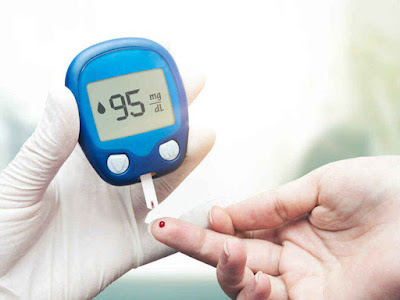As indicated by Ayurveda, diabetes is a sickness of inordinate pee. Numerous illnesses have been depicted in Ayurveda according to the three doshas - Vata, Pitta, Kapha.
Diabetes is the most widely recognized of these illnesses. It is additionally separated into two subcategories - diabetes insipidus and diabetes mellitus.
Diabetes is known to be a not kidding illness which is regularly hard to treat due to the numerous entanglements that accompany it and different organs can be impacted by it.
Beginning around 2015, it is assessed that 1.6 million passings have been brought about by diabetes, and around 2.2 million passings are because of high glucose levels. Diabetes is a persistent sickness that happens when the body can't give sufficient insulin to cells to work. The absence of insulin prompts the development of abundance sugar in the blood. What's more this is known as glycosuria and hyperglycemia. This implies you have an excessive amount of glucose in your body, and it can slow down the ordinary elements of your sensory system, heart, eyes, veins, and kidneys.
One of the significant reasons for diabetes, as depicted by Ayurveda, is a less than stellar eating routine. An eating routine weighty on desserts, sugar, dairy items, liquor, fat and bread is thought of as undesirable and isn't suggested. In different cases, diabetes can be brought about by heftiness, unnecessary rest, absence of activity, exorbitant sex, stress, uneasiness or even heredity.
Listed below are some common signs of diabetes:
- wounds heal slowly
- rapid weight loss
- blurred vision
- skin infection
- increased thirst
- extreme hunger
- Excessive fatigue
- frequent urination
Diabetes and Ayurvedic Doshas:
It is said that diabetes is mainly a Kapha disorder which occurs due to many reasons such as obesity, excessive consumption of sweet foods or excessive consumption of foods that affect Kapha.
What happens in this case is that there is a build-up of phlegm in the stomach due to poor functioning of the pancreas. This leads to turbidity or frequent urination. On the contrary when it comes to Diabetes Mellitus it is due to Vata.
In this case, Vata accumulates in the large intestine and travels to the pancreas, causing severe obstruction in its functioning. In some cases, pitta can also cause diabetes. When this happens, bile accumulates in the small intestine before passing to the liver and can damage the pancreas. In case of Pitta, Agni or Agni is more and hence there is a real possibility of burning of pancreas.
Diabetes is one of the most common diseases in the world. While some cases of diabetes are hereditary, most are due to the stresses and habits of modern life. Ayurveda refers to diabetes as diabetes which literally means 'sweet urine'. It refers to the increased blood sugar level in the blood which causes excess sugar in the urine.
The Two Types of Diabetes As Per Ayurveda
Ayurveda classifies diabetes into two types; Avarna and Dhatukshaya. The first type occurs when the body's ducts become blocked by an enlarged kapha dosha or other body tissues. It is a common cause of adult-onset diabetes. Ayurveda defines body tissues as dhatus. When these tissues are affected or destroyed, it causes type II diabetes. It is usually the cause of juvenile diabetes.
The digestive fire should be kept at a strong level so that digestion is optimal. Light breakfast and dinner is ideal. Hot food should be taken and cold food should be avoided to prevent the aggravation of cold Kapha dosha. Consumption of certain Ayurvedic herbs and formulations that aid digestion and increase the digestive fire are advised for insulin resistance treatment.
Stress is a big factor in developing diabetes. Trying to avoid stress or manage it properly helps the body balance its doshas. Adequate sleep is also one of the lifestyle changes recommended for Ayurvedic treatment of diabetes.
Can diabetes be cured completely by Ayurveda?
There are many allopathic medicines available in the market. But these medicines only provide relief from the pain and do not eliminate the root cause of the problem. Often, patients seek Ayurvedic herbs for diabetes as Ayurveda is known to be a holistic healing method and prevents diseases from entering the body. Several Ayurvedic herbs are commonly used in Indian cooking. Being aware of their health benefits helps us make more use of them in our daily diet. Knowing the benefits of each herb also leads to a better understanding of how certain Ayurvedic formulas help in the Ayurvedic treatment of diabetes. Some of the major ingredients used in Ayurveda for diabetes are as follows:
Amla
Amla or the Indian gooseberry is known to be the most potent Ayurveda herb, and it's rich in vitamin C and antioxidants; this makes it perfect for treating and keeping diabetes under control. Amla also has chromium, which is a mineral that enables proper carbohydrate metabolism. Chromium also allows your body to respond to insulin, which keeps the blood sugar under control as well. Other minerals that are present in this wonder fruit are calcium, phosphorus, and iron; they help with the body absorb insulin and regulate the blood sugar levels.
Triphala
This ayurvedic mixture is a natural immunity booster, and it's great for digestion too. This powdered formula consists of Haritaki, Amla, and Bibhitaki. The trio of ingredients is known to prevent the early onset of nasty diseases and disorders. It also contains powerful antioxidants that maintain a healthy heart and stable respiratory functions as well. The use of this mixture has been mentioned in the Sushrut Samhita, which dates back to 1500 BC. It is used as an Ayurvedic booster for digestion that improves digestion, cleanses the bowels, improves metabolism, and boosts the energy of the person. It is an Ayurvedic medicine for sugar. As it is rich in antioxidants it helps to reduce the oxidative stress of the body. It is also used in Ayurveda as a part of regimes to treat or maintain skin and hair.
Cinnamon Powder
Another natural ingredient that falls under the Ayurvedic medicine for diabetes control is cinnamon. Yes, it may be a wonderful topping for a delicious dessert dish, but cinnamon on its own is known to help decrease blood pressure and fight diabetes, as well.
Cinnamon is also known to be an effective stomach cleaner; it reduces and sharp spikes in blood sugar after meals, and increases your insulin sensitivity as well. Cinnamon has been attributed to the ability to be used as an ayurvedic herb that is a cardio tonic that helps hypertensive patients and in diabetes treatment in Ayurveda.
Ayurveda's perspective on diabetes:
Most of the people are skeptical about Ayurvedic medicine of diabetes, and they usually ask this question, "Can diabetes be completely cured by Ayurveda?"
This question arises because of the rapid progress in science and technology and its contribution to instant gratification and comfort for human beings. What people fail to understand is that Ayurveda is a holistic treatment approach, which may not provide immediate results, but it can provide effective management and long-term results for patients with uncontrolled diabetes (even with insulin and pills). gives. Another primary reason for patients turning to Ayurveda even with regular intake is insulin resistance.
According to the World Health Organization, diabetes is one of the most common diseases in the world; Management of this disease can be difficult, but it is not impossible. Certain lifestyle changes, along with Ayurvedic herbs for diabetes, can help you maintain and control your sugar levels.
Additionally, Ayurveda suggests some accessible home remedies that one can prepare; For starters, Ayurveda says that to keep your diabetes under control, you need to limit your intake of sugar and simple carbohydrates.
Here are some remedies that Ayurveda offers to maintain your blood sugar. First of all, diabetes is a kapha disorder that is metabolic in which the digestive system is impaired, and this also leads to an increase in blood sugar.
Ayurveda uses the following combination of Kutki, Punarnava, Guduchi and Shardunika together to bring blood sugar levels under control. It is recommended to take half a teaspoon with lukewarm water two to three times a day.
Put a cup of water (like ayurvedic mixture) in a copper vessel at night and drink it after waking up in the morning.
To reduce the phlegm caused by diabetes, you need to make sure that you follow a sober diet that does not include processed foods, added sugar, simple carbohydrates and full-fat dairy products. Instead, you can eat more fresh fruits, vegetables and bitter herbs.
Another way to stabilize your blood sugar is to drink warm turmeric water first thing in the morning on an empty stomach.
Ginger tea is also a natural way to control sugar, and it can also help keep your sugar at a steady level while reducing excess phlegm in your system.
It is important to note that if you have diabetes (type 1 or type 2), you should consult a medical professional before trying any of the home remedies listed above. This will help your doctor provide you with the proper dosage that will not interfere with your current medication list.
Madhumeh Niyantrak from swakalyan Ayurveda are formulated using herbal ingredients with strong anti-diabetic properties.
Additional ways to control diabetes:
- Avoid taking mid-day naps
- Reduce carbohydrate intake
- Quit alcohol and smoking
- Introduce a moderate amount of exercise in your daily routine, just enough to get the heart pumping
- Don't miss out on blood tests
- Go for regular health checkups
- Avoid adding too much oil to your food
Conclusion:
Getting rid of bad habits in today's hectic life is not easy but it is not impossible either. Stressful routines can lead to diabetes, but if you control your routine and adopt a healthy lifestyle, you can prevent the onset of this debilitating disease.
It is important to follow a holistic and natural way to control sugar, and this can be done by adopting Ayurvedic methods and medicines. Of course, a healthy diet and an ideal lifestyle are also a core part of Ayurveda.
















